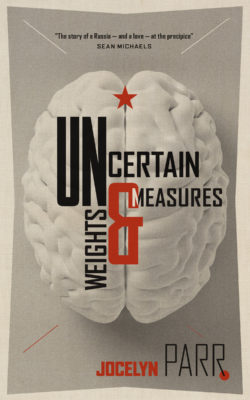“For some, this was a time of moral clarity; for others, moral clarity was a lie,” writes Jocelyn Parr in her debut historical novel. The time she refers to spans the period between 1921 and 1929 in Moscow. The aftermath of the Russian Revolution and Civil War have created a world in which experiences seem at once more vivid and more stark, especially for the young. In the novel’s opening scene, the protagonist, Tatiana, meets her future husband Sasha after an explosion strikes. The violence of the moment is startling but also invigorating to the young couple, mirroring the force and impact of both the passion that will develop between them, and the political circumstances that will continuously threaten to undermine it.
The story of young lovers set against a volatile socio-political backdrop can easily run the risk of becoming a predictable historical set piece. Over time, Tatiana and Sasha’s political and philosophical world views gradually diverge, fostering tension in the relationship. This discrepancy in perspective is foreshadowed by their different vocations: while Sasha is an artist, Tatiana is a gifted and precocious scientist, and the latter is the detail that enlivens Parr’s novel, bringing a fresh and innovative perspective.

Uncertain Weights and Measures
Jocelyn Parr
Goose Lane Editions
$22.95
paper
384pp
9780864929822
This scientific counterpoint to the overarching political action serves a number of purposes in the novel. It sharpens the historical setting by offering esoteric insight that is all the more fascinating because of its veracity. The cold, clinical, and precise nature of this setting and action lends a welcome crispness to Tatiana’s experiences. It also creates a tension between her professional reliance on facts and logic and her increasing ambivalence about her personal and political commitments. The research, which involves dissecting and inspecting internal organs, comes to function as a form of symbolism that reinforces the novel’s key themes: What does it mean to see into someone else? What always remains unknown even after the most intimate probing and examination?
Parr integrates the scientific context boldly and meticulously, most notably in a description of Sasha and Tatiana working side by side to prepare samples of brain tissue and then stain them to reveal the neurons. In addition to the conscientious historical research displayed throughout the novel, this section makes clear the thoroughness with which Parr integrates scientific knowledge into the text. More strikingly, she also inserts images into the section: photographs of the slides, and a sketch drawn by Sasha as he admires the effect of the stained neurons.
With this deft and unexpected visual insertion into the text, three ways of trying to understand the world suddenly come into contact: Tatiana’s meticulous scientific investigation; Sasha’s more intuitive, but ultimately no less acute, way of seeing the world through an artist’s eye; and the novel’s language that lies somewhere between objective study and subjective representation. The novel’s characters – in their struggle to make some semblance of sense of the world around them, and of their place in it – bring together different sets of tools that transform an account of long ago events into a meditation on how and where we strive to find certainty. mRb






0 Comments